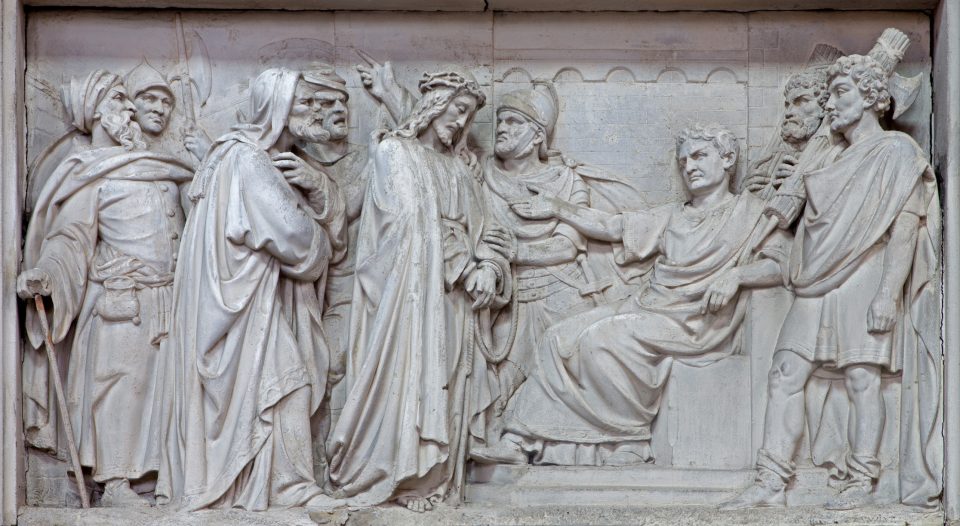Lectionary for Nov. 24, 2024
Christ the King Sunday
Last Sunday after Pentecost
2 Samuel 23:1-7; Psalm 132:1-12;
Revelation 1:4b-8; John 18:33-37
I’ve never been arrested, but I have been detained a few times. The first happened when I was 21 and studying at Hebrew University in Jerusalem the summer before my senior years of undergrad. It was at the tail end of the Second Intifada, and tensions were high. The West Bank separation wall was being built, and Israel had begun preparing to tear down settlements and withdraw Israelis from Gaza. And I, stupid college student that I was, was busy taking pictures of flowers and graffiti.
But the flowers I photographed were in front of the prime minister’s residence. And the graffiti was at the construction site of the separation wall that still cuts so many Palestinians off from their land and homes. The Israeli police who had been following me for a while finally came up to me. I was surrounded by at least four officers—at least one pointed his gun at me. After asking me what I was doing and where I came from, they took my camera. (In those days cameras weren’t part of our phones, remember?) They looked through all my photos, including the ones from the “Spring Fling” dance where I had been crowned “King of Spring.”
I was nervous. I had never lived overseas before. My Hebrew wasn’t great. My Arabic was better but wouldn’t have helped much in that circumstance. Would I be arrested? Then the police started laughing. They had found the picture of me wearing a pink shirt and red tie, trying to match my date from the dance. They said I looked “super cool” (with a sarcastic laugh), dismissively tossed my camera back to me, and told me to quit taking so many pictures. I was scared and desperate to be released from custody. Repeatedly insisting that I hadn’t done anything wrong didn’t matter. I had noticed and recorded things that I wasn’t supposed to, and it was only my “kingship” of a silly college dance that led to my release.
The Gospel reading for this week is all about Jesus’ kingship and release.
John presents an interesting exchange between Pilate and Jesus. When Pilate asked Jesus if he was a king, Jesus gave an interesting response. Instead of talking initially about himself, he spoke about his kingdom, which is not of this world—if it were, his followers would fight to keep him from “being handed over to the Jews” (John 18:36). What? Jesus had already been handed over to some Jewish leaders. His disciples fought, a little. Peter did cut off an ear. But it wasn’t much of a revolt, and Jesus was taken. Aside from some insults and a slap (18:22), “the Jews” were not the danger to Jesus. Instead, it was the Romans who would torture and murder him.
Jesus used his power to stay, to refuse release, and therefore to buy our release from slavery to sin and death.
A few verses later, indeed, the opportunity for freedom was presented when Pilate wanted to release Jesus to “the Jews” (18:39). But Jesus would ultimately tell Pilate that the Roman governor had no power whatsoever to hold or release him—unless it had been granted to him from above (John 19:10-11). Jesus had all the power, as the king on David’s throne (Psalm 132:12). Yet, release was the most dangerous thing for Jesus’ true kingdom.
At any moment throughout the humiliation, torture and murder, Jesus could have commanded legions of angels to free him and smite the Roman executioners and the few Sadducees who conspired to entrap him. But this is the kind of king that Jesus is: he chose to refuse release, even though he was scared and fervently wished that the cup filled with trauma and abuse he was about to endure could be removed (Matthew 26:39, John 18:11)
On Christ the King Sunday, let us reflect on Jesus’ kingship. He used his power to stay, to refuse release, and therefore to buy our release from slavery to sin and death.
The “King of Spring” would have done just about anything to be released and run from the police as they looked through his photos. King Jesus, however, did everything to avoid release, even if his disciples wished it, so he could stay in a horrible situation. His refusal to be released means release for us from all that binds. Hail to this King!





